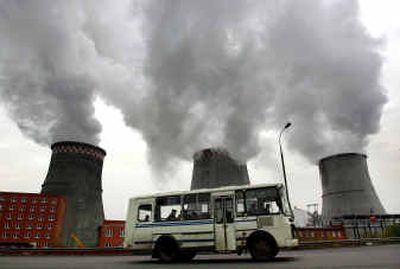Global warming pact to kick in

MOSCOW – Russia gave final approval to the Kyoto Protocol on global warming as President Vladimir Putin signed legislation ratifying the landmark environmental pact that seeks to slow global warming by reducing greenhouse-gas emissions, the Kremlin said Friday.
The protocol, ratified by both houses of Russia’s parliament last month, commits 55 industrialized nations to make significant cuts in emissions of gases like carbon dioxide by 2012.
The United States and Australia have rejected the pact, which was signed by Putin late Thursday and could not have come into effect without Russia, which accounted for 17 percent of carbon dioxide emissions in 1990. The United States accounted for 36 percent of carbon dioxide emissions that year.
Germany praised Russia’s ratification, joining Japan, Britain and others in saying the pact should give new impetus to countries trying to tackle transnational environmental problems.
“With the entry into force of the protocol, it sees a decisive step by the international community toward more climate protection,” said Hans-Hermann Langguth, a spokesman for German Chancellor Gerhard Schroeder.
Japanese Environment Minister Yuriko Koike said earlier this week that Tokyo – one of the pact’s biggest promoters – would “continuously urge the United States, Australia and other countries which have not ratified the protocol” to do so.
The pact’s approval followed fierce debate among Russian officials. Opponents, led by Putin’s economic adviser, Andrei Illarionov, warned that it would hobble the nation’s humming economy.
Kyoto backers, however, rejected the claim, saying that even after a five-year recovery, the post-Soviet economic meltdown has left emissions some 30 percent below the baseline.
Energy Minister Viktor Khristenko said Friday he “shared the skeptical attitude” of opponents, according to the ITAR-Tass news agency, but he noted that it would also form “a new sector on the global market, which is both interesting and promising.”
Putin pledged in May to speed up approval in return for the European Union’s support of Russia’s bid to join the World Trade Organization. The 1997 pact will take effect 90 days after Russia notifies the United Nations of its ratification.
One of the key provisions of the pact allows countries to trade greenhouse gas emission allowances. The European Union is launching a trading system in January under which European companies that emit less carbon dioxide than allowed can sell unused allotments to those which exceed the target.
The profit motive is expected to drive efforts and technology, and EU officials expect “substantial cuts” in emissions of carbon dioxide, which makes up 80 percent of the EU’s greenhouse gases.
Russia’s rusting Soviet-era power stations, aging pulp mills and creaking blast furnaces could potentially be the biggest source of emissions quotas for Kyoto signatories, Kyoto specialists say – and could thus attract foreign investment. Under the treaty’s so-called Joint Implementation, foreign companies will be able to invest in cleaning up the country’s decrepit industry and claim the emissions reductions achieved as their own.
Economist Yuri Safonov, with the Russian Higher School of Economics, told ITAR-Tass that Russia should be able to sell quotas for the discharge of about 2.2 billion tons of greenhouse gases without hurting its economy.
“This amount is no problem for the Russian industry,” Safonov said. “It will enable the country to attract new investments in the development of its fuel and energy complex, including the thermal electrical utilities, and in the housing and utility services.”
Industrialized countries will have until 2012 to cut their collective emissions of six key greenhouse gases to 5.2 percent below the 1990 level. Greenhouse gases are believed to trap heat in the atmosphere, warming the Earth and changing the climate.